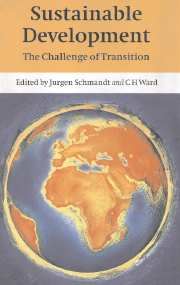Book contents
- Frontmatter
- Contents
- List of contributors
- Foreword
- Preface
- 1 Challenge and response
- 2 National self-interest in the pursuit of sustainable development
- 3 Uneconomic growth: Empty-world versus full-world economics
- 4 Population and consumption: From more to enough
- 5 Spirituality and sustainability
- 6 Leadership skills for sustainable development
- 7 The role of science: Guidance and service
- 8 Economic tools, international trade, and the role of business
- 9 Stakeholders and sustainable development
- 10 From idea to action: The role of policy
- Index
9 - Stakeholders and sustainable development
Published online by Cambridge University Press: 17 August 2009
- Frontmatter
- Contents
- List of contributors
- Foreword
- Preface
- 1 Challenge and response
- 2 National self-interest in the pursuit of sustainable development
- 3 Uneconomic growth: Empty-world versus full-world economics
- 4 Population and consumption: From more to enough
- 5 Spirituality and sustainability
- 6 Leadership skills for sustainable development
- 7 The role of science: Guidance and service
- 8 Economic tools, international trade, and the role of business
- 9 Stakeholders and sustainable development
- 10 From idea to action: The role of policy
- Index
Summary
Sustainable development will involve a departure from the norms that have been prevalent over recorded history. This change is necessitated by the fact that human activities are much more pervasive and much more disruptive than they were historically. Herman Daly has written much about the transition from “empty world” thinking to “full world” thinking.
In many respects, an analogy to a map is appropriate. The societal maps that have been handed down from generation to generation have arbitrary boundaries and may no longer be appropriate for the types of challenges that humans are now facing. To define sustainable development is to attempt to create a new map of human interaction and direction. In the new map for sustainable development, there are certain norms that are likely to emerge and that are directly germane to social structure.
Many elements will comprise the concept of sustainable development. At the least, there will be consideration of future generations, a fusion of economic, ecologic, and community issues and the development of cooperative structures for dispute resolution and for daily living. Among these issues are implications for virtually every discipline. A key concept of sustainable development will be the integration of community and stakeholder concerns into economic and ecological concerns as shown in Figure 9.1. The goal of sustainable development is to ensure that all four elements – basic needs, ecology, ecoefficiency, and community empowerment – plus the transgenerational element are considered in the decision-making process.
This paper will explore the community and stakeholder concerns associated with sustainable development.
- Type
- Chapter
- Information
- Sustainable DevelopmentThe Challenge of Transition, pp. 175 - 202Publisher: Cambridge University PressPrint publication year: 2000
- 3
- Cited by



